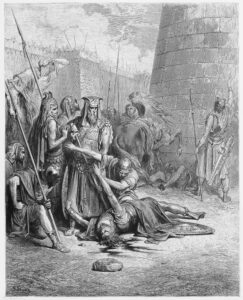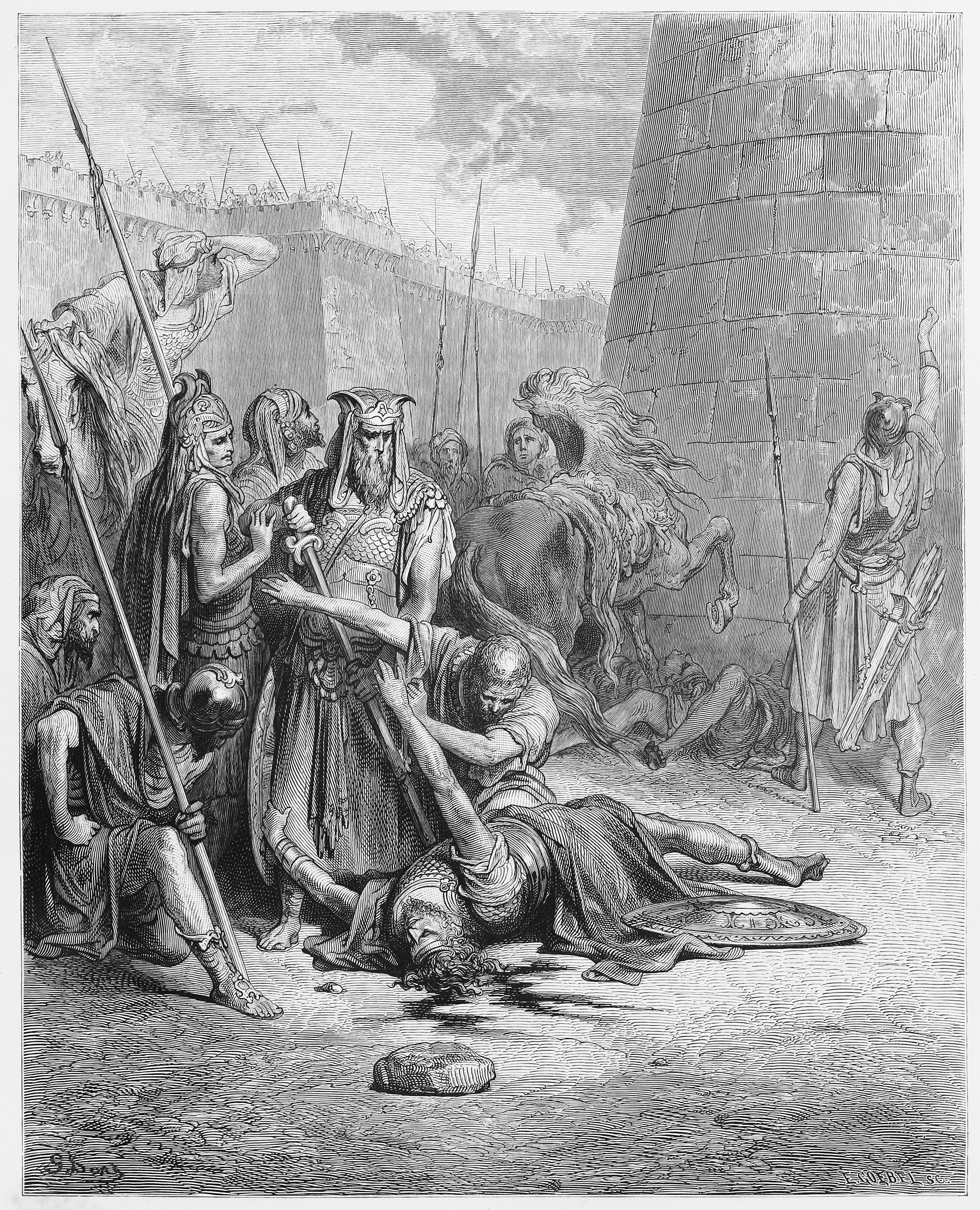Judges Abimelech’s End

Abimelech’s end is poetic justice for the evil that he did to his brothers. There is also justice meted out to the leaders of Shechem for their part in the plot.
It takes time, but Abimelech and the leaders of Shechem DO pay for their crimes. I wonder if the “worthless men” Abimelech hired pay too. I certainly hope so. They may be some of the men that join up with Abimelech for the long haul. We don’t see them punished for certain, but I don’t believe God would let them off the hook so easily.
Relations change between Abimelech and the leaders of Shechem. They shift enough that Abimelech no longer lives in the city and the leaders of Shechem actively (although secretly) try to rid themselves of any association with Abimelech. Let’s join in the story and watch as God pays them all back.
♥ ♦ ♥
Abimelech is loving every minute of being king! EVERYONE jumps to attention as the slightest utterance he makes. His every desire is tended to and his word is law. Abimelech chose to move his ‘throne’ back to his own home; the city or Arumah. It was from here that he had first approached his mother about putting in a good word for him. He has been ruling Shechem from here.
That is, up until recently. There is a growing resistance by the leaders of Shechem to everything Abimelech does. They seem to be going out of their way to challenge him. Abimelech doesn’t like this growing tension, but he decides to let it ride and see what becomes of it.
With Abimelech’s inactivity in addressing the unrest, it sinks even deeper into the hearts of the leaders of Shechem. They are tired of Abimelech’s attitudes and him in general. They don’t see that he has done anything to improve their standing in the world. And his repeated demand for tribute is more than they care to bear. The leaders of Shechem call a meeting to deal with their problem.
“It’s time we do something about Abimelech, besides stand here wringing our hands.”
“And what would you suggest we do?”
“We could go to war against him.”
“Are you kidding? We don’t have an army! And who is to know which side the soldiers would lend themselves to.”
“What if we set an ambush in the hills. There is only one road in and out of Arumah. If we set men in the hills there, they could fall on Abimelech as he traveled. We could be rid of him in a matter of days!”
“Let’s do it!” was the cry echoed throughout the leadership chamber.
The leaders found men loyal only to their pockets and hired them to set an ambush in the hills near Arumah. The men hid in the forest near the road and waited. Abimelech wasn’t coming out of the city, so they had no opportunity to take him.
After a week, they decided to change their tactic. They would attack anyone who passed by. They would rob them of all their wealth and send them on their way, defeated. This became great fun for the men lying in ambush, as many travelers fell under their hand.
What they didn’t realize was that this also disclosed their tactic and position to Abimelech. There would be no surprise ambush against Abimelech. Worse than that, at least for the leaders of Shechem, was that Abimelech was able to convince the men set in ambush that they could make more money by NOT attacking Abimelech. Abimelech agreed to allow them to continue to plunder those passing back and forth, but they would receive double for letting Abimelech and his men pass by undisturbed. Abimelech didn’t even tell them that they had to stop receiving pay from the leaders of Shechem. Talk about being is a ‘cherry’ position!
With the ‘hired help’s’ inability to deliver Abimelech to them, the leaders of Shechem lost interest in their ambush. One day, a new opportunity arose. A bold man and his family moved to Shechem. He was a prosperous man and was wise beyond his years; or so the leaders believed. His name was Gaal and he and his family purchased a vineyard and homes just outside the city of Shechem.
As quickly as Abimelech fell out of favor with the leaders of Shechem, Gaal gained favor with them. One day, after having harvested his vineyard, pressing his grapes, and making wine, Gaal invited all the leaders of Shechem to the house of their god to celebrate their good harvest. Gaal supplied all the wine and food, and what a meal it was! Wine flowed freely and the best dishes were served.
The evening wore on and the guests became more and more boisterous. They began to revile Abimelech and lament ever making him king over themselves. Gaal captured the attention of everyone when he spoke against Abimelech. Though he was new to the community, he offered them a semblance of hope.
“Who is Abimelech, and who are we of Shechem, that we should serve him? Is he not the son of Jerubbaal, and is not Zebul his officer? Serve the men of Hamor the father of Shechem; but why should we serve him? Would that this people were under my hand! Then I would remove Abimelech. I would say to Abimelech, ‘Increase your army, and come out.’” (Judges 9:28-29)
Not everyone was enamored by Gaal and his words against Abimelech. Abimelech’s greatest supporter in Shechem, Zebul, had purposefully NOT been invited to the feast. His loyalty was known by most and suspected by others. But he had spies among the servants who brought him relevant information when they encountered it. The words of Gaal certainly qualified as such.
One of Zebul’s well placed spies brought him word of Gaal’s boast the next morning.
“Gaal believes he could ‘remove Abimelech’ does he. Wait until Abimelech hears about this. You have done well in bringing me this information. Wait here while I compose a message to Abimelech. You will deliver it to Arumah.”
“What of the ambush that is laying in the way? Will they not stop me?”
“I will give you a tribute to pass on to them so they will give you safe passage.”
Zebul’s informant is pleased with this plan and waits patiently for his master to complete his message. Once it was ready, Zebul cautioned his messenger to commit this message to memory and to deliver it to NONE but Abimelech himself.
“If anyone asks, you are going to see your family. Tell no one but Abimelech himself of your true mission. Not even those of the ambush. Pay the tribute and move on.”
“Yes my lord. You can count on me. Consider this message as good as delivered.”
Zebul watched his servant leave the city. He trusted this man above all his other servants, but would he be able to complete the task? Zebul certainly hoped so.
The servant easily made it through the ambush by simply mentioning his master’s name. The tribute stayed hidden in the folds of his garments. As one of the city leaders Zebul’s name was well know to them and his continued favor meant continued profits for the men of the ambush. Zebul’s name also gave the servant instant access to Abimelech himself. Zebul was Abimelech’s secret ‘weapon’ inside the city of Shechem.
“My master Zebul has a message for you my king” the servant said while bowing low to the ground before Abimelech.
“Speak man” commanded Abimelech.
The servant told Abimelech of the festival he served at and of the man Gaal’s words. Then he relayed Zebul’s secret plans to him. “My master knows that you do not fear the ambush raised against you outside your door, and calls for you to come quickly and rid the leaders of Shechem of their false hope in the man Gaal.”
Abimelech listened intently to all the messenger had relayed. The plan was sound and would teach the leaders of Shechem where the real power lay. “Stay here with me. I will return you to your master as we make our ambush. There is no need of you facing the ambush from Shechem a second time.”
The servant bowed low to the ground before leaving the throne room. He would wait to see where he would be placed in the company of Abimelech.
By nightfall everything was ready. Abimelech had given orders to his commanders. His forces would be divided into four parts and each part would take up a position outside the city, hidden in the hills and the fields. When the city gates opened, they were to rush towards them while keeping low as long as possible, to prevent discovery and reclosing of the gates.
The first rays of dawn are breaking over the hills and Abimelech’s troops are poised for battle. Zebul’s servant is at Abimelech’s side. “Stay close to me. I will protect you and see you safely back to your master” Abimelech assures him.
As the sun pees its face above the mountain, the gates of the city are drawn inward. Gaal is the first through the gates. He takes in a deep breath and surveys the countryside. Zebul follows quickly behind him. Zebul is looking for something specific. Once he spots it, he does everything he can to keep Gaal from seeing it.
Abimelech’s men see the gates open and two men stride into the opening. They recognize Zebul but not the second man. Zebul’s servant quickly tells Abimelech that the man in the gate is Gaal. Abimelech waves a hand forward and all four ambushes begin quickly making their way towards the city. Abimelech is in the group closest to the gate; in the fields surrounding the city.
Gaal sees the advancing men in the mountains and mentions them to Zebul.
“Look, people are coming down from the mountaintops!” (Judges 9:36a)
Zebul has a reply ready to forestall discovery. “You mistake the shadow of the mountains for men” (Judges 9:36b) he says with a dismissive tone.
Gaal only questions his eyes for a moment before pointing out the men approaching. “Look, people are coming down from the center of the land, and one company is coming from the direction of the Diviners’ Oak.” (Judges 37)
Zebul’s face takes on a malicious smile as he says to Gaal; “Where is your mouth now, you who said, ‘Who is Abimelech, that we should serve him?’ Are not these the people whom you despised? Go out now and fight with them.” (Judges 9:38)
Gaal looks back and sees the leaders of Shechem have made their appearance at the gate. Still full of bravado from the night before Gaal yells; “Follow me” and they all rush out to meet Abimelech.
It was Abimelech’s orders not to kill anyone; only wound and frighten beyond reason. As Gaal saw the danger before him, he fled Shechem. Abimelech chased him through the hills until he was miles away from the city. Abimelech allowed him to live. “The man will not speak this way of me again” reasoned Abimelech. Zebul’s servant returned to his side as Abimelech returned to Shechem to see the results of his work. Many of the leaders of Shechem lay wounded at the gate, crying out for mercy as Abimelech stood over them. Abimelech spat at them, then turned his forces and returned to his home.
Abimelech had not forgotten the arrogance and treachery of the leaders of Shechem. He stewed on it for a while. He would wait until they let their guard down, then he would do to the city as it deserved.
Gaal came sneaking back into Shechem later that evening. Zebul convinced the city elders that Gaal was the reason Abimelech attacked in the first place and that they should put him and his family OUT of the city. This sounded like wise counsel and Gaal and his whole family were sent from Shechem, never to return.
The next morning, the gates of the city were open wide and the people returned to the fields. It was harvest time. And it was a ‘now or never’ situation. Without the harvest, they would starve when winter came. Their fear of Abimelech was smaller than their fear of starvation.
Abimelech had guards posted, watching the city. They reported to him on the comings and goings. When the people returned to the fields, they hurried to bring him word.
“The mice have finally crawled from their dens. They believe they are safe now. Let them think that for another day. Then they will see the price of rebellion against Abimelech” he roared.
Abimelech was ready the next morning. He had divided his men into three companies and placed them in ambush around the fields. When the gates opened wide and the people poured out into the fields, Abimelech and his group rushed to the gates while the other two companies attacked all who were in the fields. This time their orders were to kill, not just wound.
Abimelech rushed through the gates and began attacking the city. The leaders of the city quickly retreated to safety inside the Tower of Shechem. The other two companies joined Abimelech once the people in the field were dispatched. They fought side by side all day to subdue the city. They captured the city, killed all who were in it, set it aflame, and salted it so that nothing would grow again.
It was time for Abimelech to turn his attention to the Tower of Shechem. There was no way he was going to let the leaders escape punishment. He didn’t know it, but the Lord was using him as His instrument of punishment for the leaders of Shechem’s hand in the death of his brothers.
Abimelech came to the Tower of Shechem. It was barred securely and he could not breach it. He had another idea. He walked outside the city to Mt. Zalmon to where large bushes of wild brush growing. Using his sword, he cut down a large bush, slung it across his back, and carried it back to the base of the tower. Then he called out to his men; “What you have seen me do, hurry and do as I have done.” (Judges 9:48b)
His men each followed suit. Before long, the Tower of Shechem was surrounded in brush to the height of the second story. All that remained now was for Abimelech to touch a torch to them. With a smile that would bring fear to ANY heart, Abimelech moved around the tower, touching his torch in a new place every few steps. After he made it all the way around the tower, he stepped back and watched the flames grow higher.
Screams of terror began to emanate from the building. Abimelech laughed as he watched the tower itself ignite. Any who attempted to flee the fire, through a window or a door, were immediately cut down. None survived the inferno; fulfilling the words of Jotham; the youngest son of Gideon.
After the defeat of Shechem, Abimelech moved onto the city of Thebez. Abimelech and his men besieged the city until the gates fell. By this time, all the people; men, women, and the leaders of the city, had shut themselves up in the tower stronghold within the city. Abimelech advanced on the tower, believing he could conquer it just as easily.
While Abimelech was approaching the tower, many of the people had moved onto the roof so they could see his movements. As Abimelech began cutting down brush and piling it near the door, the people began to panic. One woman saw and upper millstone sitting nearby. With all her might, she moved it to the side of the tower, right over the door. When Abimelech moved to the door again, she pushed it from the roof and if plummeted down upon his head.
Abimelech’s scull was crushed and he felt the life draining from his body. With his remaining breath, he called out to his armor bearer. “Draw your sword and kill me, lest they say of me, ‘A woman killed him.’” (Judges 9:54) The armor bearer did as Abimelech commanded, and Abimelech death was recorded as a result of the wound struck by his servant.
God had paid Abimelech and the leaders of Shechem back for their parts in the murder of Gideon/Jerubbaal’s sons, in the manner of the curse of Jotham.
(to be continued)
I still wonder about the men who helped Abimelech. What became of them? What happened to Jotham after Abimelech’s death? I think I suffer from the perpetual “Now what” syndrome. I want to know what happened to, and after, and where, and when, and… Sometimes I have to leave the story where it is and be satisfied. When I get to Heaven, I’ll have plenty of time to ask all the questions I stored up here on earth.
Father God, THANK YOU for being the one Who ALWAYS balances the scales of injustice. I may not always see it, or comprehend how it worked, but YOU are a righteous judge. You took up for Jotham’s brothers when he had no means to avenge their deaths on his own. IN THE END it all balances; including those sins covered under the blood of Jesus. HE paid their penalty on the cross. I know I have more than my share of them blotted out because of His blood. Keep me ever mindful of that balance when I begin to judge someone else.
Some acts are truly right and wrong. Abimelech’s actions were on the wrong side for certain. But You used him as Your instrument too. NO ONE is beyond Your reach.




